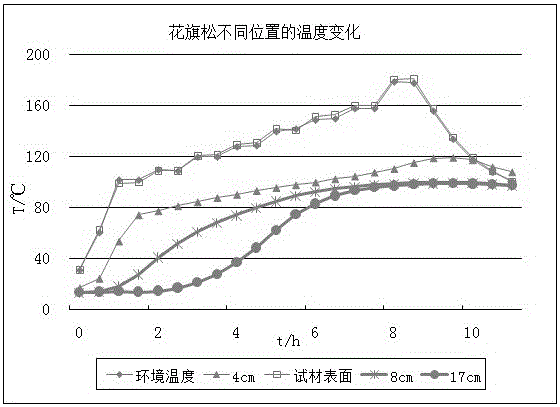Thermal modifying method suitable for logs or thick lumbers
A technology of thermal modification and log, applied in the field of thermal modification of logs or thick square timber, can solve the problems of the decline of mechanical properties of heat-treated wood, overcome the significant decline in mechanical properties, prevent moisture absorption and penetration, and broaden the scope of application Effect
- Summary
- Abstract
- Description
- Claims
- Application Information
AI Technical Summary
Problems solved by technology
Method used
Image
Examples
Embodiment 1
[0027] The thermal modification method of the wood of the present embodiment, concrete steps are:
[0028] (1) Preparation stage: put the wood with a moisture content of 7~8% into the processing kiln;
[0029] (2) Heat treatment: Introduce nitrogen gas into the treatment kiln, raise the temperature in the kiln to 80°C within 1 hour, then raise the temperature from 80°C to 145°C at a rate of 15°C / h, and then from 145°C to 25°C / h The temperature is raised to 170°C at a rate of h;
[0030] (3) Cooling down: Turn off the heat source, lower the temperature in the kiln at a rate of 35°C / h, discharge the nitrogen in the kiln out of the kiln, and at the same time pass in nitrogen at normal temperature into the kiln, after the temperature in the kiln drops to 100°C, Air is introduced into the kiln, and water is sprayed into the kiln at the same time.
Embodiment 2
[0032] The thermal modification method of the wood of the present embodiment, concrete steps are:
[0033] (1) Preparation stage: put the wood with a moisture content of 7~8% into the processing kiln;
[0034] (2) Heat treatment: Introduce nitrogen gas into the treatment kiln, raise the temperature in the kiln to 90°C within 1 hour, then raise the temperature from 90°C to 150°C at a rate of 13°C / h, and then from 150°C to 23°C / h The temperature is raised to 160°C at a rate of h;
[0035] (3) Cooling down: Turn off the heat source, lower the temperature in the kiln at a rate of 30°C / h, discharge the nitrogen in the kiln out of the kiln, and at the same time pass in normal temperature nitrogen into the kiln, after the temperature in the kiln drops to 100°C, Air is introduced into the kiln, and water is sprayed into the kiln at the same time.
Embodiment 3
[0037] The thermal modification method of the wood of the present embodiment, concrete steps are:
[0038] (1) Preparation stage: put Douglas fir wood with a moisture content of 7-8% into the processing kiln;
[0039] (2) Heat treatment: Introduce nitrogen gas into the treatment kiln, raise the temperature in the kiln to 100°C within 1 hour, then raise the temperature from 100°C to 140°C at a rate of 10°C / h, and then from 140°C to 20°C / h The temperature is raised to 180°C at a rate of h;
[0040] (3) Cooling down: Turn off the heat source, lower the temperature in the kiln at a rate of 40°C / h, discharge the nitrogen in the kiln to the outside of the kiln within 10 minutes, and at the same time pass nitrogen at room temperature into the kiln, and then the temperature in the kiln will drop to 100°C , into the kiln air, spray water into the kiln at the same time.
[0041] For verifying the effect of heat treatment method of the present invention, choose a long 79cm in the heat ...
PUM
 Login to View More
Login to View More Abstract
Description
Claims
Application Information
 Login to View More
Login to View More - R&D
- Intellectual Property
- Life Sciences
- Materials
- Tech Scout
- Unparalleled Data Quality
- Higher Quality Content
- 60% Fewer Hallucinations
Browse by: Latest US Patents, China's latest patents, Technical Efficacy Thesaurus, Application Domain, Technology Topic, Popular Technical Reports.
© 2025 PatSnap. All rights reserved.Legal|Privacy policy|Modern Slavery Act Transparency Statement|Sitemap|About US| Contact US: help@patsnap.com

